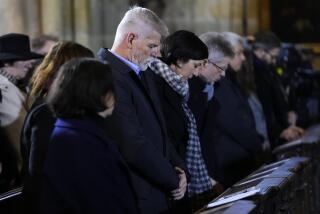S. Africans Observe Reconciliation Day : Thousands Gather to Pray; Some Blacks Stay Home From Work
JOHANNESBURG, South Africa — Hundreds of thousands of South Africans, whites as well as blacks, gathered on Wednesday for a few moments of prayer in a day of national reconciliation after more than a year of sustained civil unrest in which more than 750 persons have died.
Special services to pray for peace were held in hundreds of churches across the country in an outpouring of national anguish over the continuing violence here. At many offices and factories, work was halted for 30 minutes or an hour so that employees could join the national “pray day.”
Many black workers--perhaps as many as 40% of those in Johannesburg, Durban and Port Elizabeth--also stayed home in protest against apartheid and minority white rule. Major employers had said that workers would be allowed a day of unpaid leave Wednesday.
The government opposed the church-organized National Initiative for Reconciliation, as the special prayers were called, because of its “potential for violent confrontations” between militant blacks and the police. But only limited violence was reported by police headquarters in Pretoria on Wednesday evening, and the general strike feared by some employers did not materialize.
Doused With Gasoline
Two blacks were found dead Wednesday morning in ghetto townships outside Port Elizabeth in eastern Cape province, according to police. Both had been doused with gasoline, set afire and burned to death, one under a pile of old tires and the other with tires around his body, in what has become the execution ritual for blacks believed to be police informers or government collaborators.
A third man, of mixed-race (Colored), was doused with gasoline and set on fire while going to work outside Johannesburg.
Heavily armed police and troops were in Soweto, the black satellite city outside Johannesburg, in the ghetto townships east of here and those around Cape Town, Durban, Port Elizabeth and other cities to maintain order and prevent gangs of black youths from intimidating those going to work.
Wednesday’s most serious incidents occurred in Soweto, where police repeatedly used tear gas and birdshot to disperse large groups of black youths, some numbering several thousand, who were barricading sections of the city. Policemen, armed with rifles and shotguns against youths throwing stones or firebombs, rode most buses leaving and entering Soweto; similar action was taken to protect commuter trains. About 40% of Soweto workers are believed to have stayed home.
Police, Youths Clash
Police said they clashed several times with groups of youths throwing stones and firebombs around Durban and Cape Town.
While most blacks, Asians and Coloreds went to work as usual in Cape Town, about a third of the nonwhite workers did not report Wednesday in Durban, Port Elizabeth and East London, according to the South African Press Assn.
Churches here and in Cape Town, Durban and other cities were filled at noontime by workers who had been given extra time to participate in the services, and there seemed to be a rare unanimity in this divided and strife-torn nation that a solution must quickly be found for its problems.
“I am sure that you, like me, must be very confused and that, like me, you are probably looking for a way out,” Father Basil van Rensburg, the pastor of Cape Town’s Holy Cross Catholic Church, said in a sermon at St. Mary’s Catholic Cathedral there.
“We are all guilty of the terrifying situation our country is in. We were either too insensitive to care, or the situation was too far removed from us--a mere four miles down the road, perhaps. This land will be healed. But it is up to us now,” he said.
Threats Rout Tutu
In Johannesburg, Bishop Desmond Tutu, who originally proposed the “day of prayer and penitence,” was routed from St. Mary’s Anglican Cathedral along with 150 others while praying silently at a morning service when police received two telephoned bomb threats. No bomb was found, and the service was resumed.
The special prayers were arranged last month by more than 400 church leaders from 48 Christian denominations who called upon the country to “repent for the national sin of apartheid” through prayer, fasting and penance. Tutu originally wanted a weeklong observance, but agreed to a single day when white clergymen, including Afrikaners, joined the appeal. The white Dutch Reformed Church, to which Afrikaners, who hold most political power, largely belong, refused to endorse the call.
More to Read
Sign up for Essential California
The most important California stories and recommendations in your inbox every morning.
You may occasionally receive promotional content from the Los Angeles Times.










